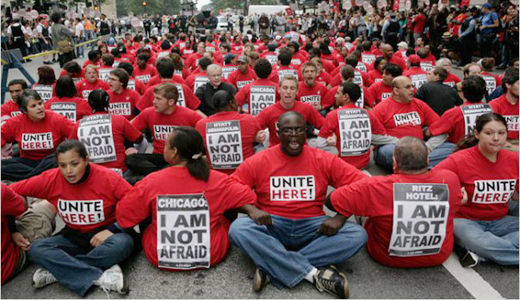
WASHINGTON – The National Labor Relations Board‘s top lawyer is turning his attention to overly broad “employee handbooks” that curb or violate workers’ rights, and especially their “at will” employment clauses, legal blogs reported in October.
The blogs add that NLRB’s Acting General Counsel, Lafe Solomon, discussed his handbook scrutiny in a speech to the Connecticut Bar Association and that he bases it on a settlement signed on May 22 with Hyatt Hotels Corp. by NLRB’s Phoenix office.
The curbs on workers, which Hyatt agreed to drop, were part of that settlement, its text shows. And Hyatt agreed to remove a key paragraph where all employees agreed they are “at will” workers – i.e. non-union – unless they get top management permission to change their status.
So far two such at will disclaimers have been struck as a violation of the National Labor Relations Act, employment law attorney Deanne Katz wrote in an Oct. 23 Findlaw blog. “Both have had a similar problem: They’ve been excluded because they discourage collective bargaining.” Other blogs issued similar analyses.
“Both the at-will disclaimers the NLRB challenged involve statements that an employee’s at-will status cannot be altered with the written signature of a high-level executive. That limitation is what the NLRB has focused on,” Katz wrote.
“Telling employees they can’t alter their status without this specific approval makes it appear unlikely that collective bargaining through a union could have a positive effect on employee status. That in turn discourages employees from joining unions, in the view of the NLRB, and that is what they object to.”
The Hyatt settlement is also important to other workers as it shows what type of employer curbs on worker rights, through handbooks, are not kosher as far as the NLRB is concerned. Hyatt agreed to drop the handbook language even though it denied, in the settlement that the language broke labor law.
Besides tossing the at-will section, Hyatt also agreed to evict many other statements from its handbook. Violations would lead to discipline. They included:
- Overbroad bans of “disclosure of confidential information,” along with overbroad definitions of confidential info. Training manuals were one example.
- A ban on participation in “civic or professional organizations” which might result in disclosure of Hyatt’s confidential information, including its finances.
- Banning “derogatory, unfounded” or disparaging statements about Hyatt, its directors, managers, officers or workers.
- Wearing only Hyatt “approved or authorized” union pins on the job.
Photo: Hyatt workers at 2010 sit-in in the streets of Chicago. Photo courtesy of Local 1 UNITE HERE. This story was distributed by Press Associates International.

MOST POPULAR TODAY


Zionist organizations leading campaign to stop ceasefire resolutions in D.C. area

Communist Karol Cariola elected president of Chile’s legislature

Afghanistan’s socialist years: The promising future killed off by U.S. imperialism

High Court essentially bans demonstrations, freedom of assembly in Deep South






Comments